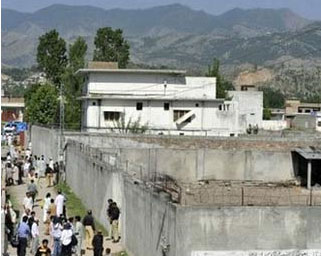Obama questions ally Pakistan on Osama bin Laden
US President Barack Obama pressed Pakistan on Sunday to probe how Osama bin Laden managed to live for years under the noses of its military, saying he must have had some kind of support network.
 But one week after an elite team of Navy
SEALs killed the Al-Qaeda leader and seized a treasure trove of documents and
computer files, senior US
officials said they still had no proof Islamabad
knew about his hideout.
But one week after an elite team of Navy
SEALs killed the Al-Qaeda leader and seized a treasure trove of documents and
computer files, senior US
officials said they still had no proof Islamabad
knew about his hideout.
The fact that Osama was "hiding in plain sight," as the White House described it, for several years in a garrison city less than a mile from a top military academy has deeply strained crucial US-Pakistan ties.
Outraged US lawmakers have voiced suspicion that elements of Pakistan's military intelligence services must have known his whereabouts, and are demanding that billions of dollars in American aid is suspended.
"We think that there had to be some sort of support network for (Osama) bin Laden inside of Pakistan," Obama, speaking on the matter for the first time, told the CBS show "60 Minutes," according to a interview excerpt released on Sunday.
"But we don't know who or what that support network was. We don't know whether there might have been some people inside of government, people outside of government, and that's something that we have to investigate and, more importantly, the Pakistani government has to investigate."
US official say a vast trove of data including video, digital and audio files, printed items, computer equipment, recording devices and handwritten documents was seized in Monday's pre-dawn raid.
White House National Security Advisor Tom Donilon suggested nothing had yet been unearthed that directly implicated the Pakistani authorities.
"I've not seen evidence that would tell us that the political, the military, or the intelligence leadership had foreknowledge of (Osama) bin Laden," he told NBC's "Meet The Press" program.
Donilon described the data haul from the raid as the richest terrorism treasure trove ever collected.
"This is the largest cache of intelligence derived from the scene of any single terrorist," he said. "It's about the size, the CIA tells us, of a small college library."
With Al-Qaeda having acknowledged Osama's death - and vowing to avenge it - debate is now swirling over who might take the reins of the terror network.
Donilon said the United States was focusing its attention on Osama's longstanding deputy, the Egyptian Ayman al-Zawahiri.
"Zawahiri will be the next number one terrorist that we're looking for in the world," he said.
Like Osama, he has been in hiding since the September 11, 2001 terror strikes on the United States, which killed almost 3,000 people.
Reportedly last seen in October 2001 in eastern Afghanistan, close to the lawless tribal regions along the Pakistan border, Zawahiri has released several videos from hiding, calling for war on the West.
Pakistan's military has hit back at allegations it knew about Osama, demanding the US cut its troop presence in the country to a "minimum" and threatening to review cooperation if a similar unilateral raid is conducted.
But while US officials have stopped short of directly accusing the Pakistanis, recent senior political figures who are freer to express their opinions warned against such "bluster".
"The idea that he could be in a suburb, essentially, of Islamabad is quite remarkable," Condoleezza Rice, who was secretary of state under president George W. Bush from 2005 to 2009, told ABC's "This Week."
"And so Pakistan has some very hard questions to answer, and this isn't a time for bluster from Pakistan."
Pakistan's ambassador to Washington Husain Haqqani acknowledged "there was a crack that things fell through" and said "Pakistan will investigate," but he insisted officials were unaware that Osama was hiding so close.
"If any member of the Pakistani government, the Pakistani military, or the Pakistani intelligence service knew where Osama bin Laden was, we would have taken action," he told ABC.
As the Osama raid lays bare the clear distrust the United States feels for Pakistan, Donilon suggested a "good starting point" would be for Islamabad to provide direct access to Osama's detained wives.
"They have in their custody all the non-combatants from the compound, including three wives of Osama bin Laden," he told ABC.
Washington had yet to be given access, Donilon said, but "we haven't been told we can't either at this point. We'll certainly press on this very hard."
Pakistani security officials said Osama's Yemeni wife, who was shot in the leg during the raid, is undergoing medical treatment and interrogation in Pakistan along with 15 other relatives.
"She said in Arabic that (Osama) bin Laden and his family were living in this compound for the last five years and he never left the compound," one official said, speaking on condition of anonymity.
The fact that Osama turned up in leafy Abbottabad, home to the Pakistani equivalent of the West Point and Sandhurst military academies, just two hours' drive north of Islamabad, has been greeted with incredulity.
The Obama administration last year said it would seek another $2 billion for Pakistan's military, on top of a five-year, $7.5 billion civilian package approved in 2009 aimed at weakening the allure of Islamic extremists.
For a decade, Islamabad has been America's wary Afghan war ally, despite widespread public opposition and militant bomb attacks across the nuclear-armed country that have killed several thousand people.
But Pakistan has never been fully trusted by either Kabul or Washington, which accuse its powerful military of fostering the Afghan Taliban it spawned during the 1980s resistance to the Soviet occupation of Afghanistan.
Osama bin Laden warned in the final audio tape he recorded before being killed by American commandos there will be no US security without Palestine security, an Islamist website reported on Sunday.
Addressing US President Barack Obama, he said: "America will not be able to dream of security until we live in security in Palestine. It is unfair that you live in peace while our brothers in Gaza live in insecurity."
"Accordingly, and with the will of God, our attacks will continue against you as long as your support for Israel continues," he warned in a message posted on Shamikh1.net, a conduit for Al-Qaeda communications.
The founder of Al-Qaeda said he had tried to send a "message" to the United States through Nigerian Umar Farouk Abdulmutallab, who tried to explode a bomb on a Detroit-bound US airliner in December 2009.
"If it were possible to send you messages by way of words, we would not have had to use planes to send them to you," he said.
"So the message we wanted to convey through the plane of our hero, the fighter Umar Farouk, may God be with him, confirms a previous message which had been sent to you by our heroes of September 11," he said in a clear reference to the September 11, 2001 attacks against the United States.
The audio recording lasted just over a minute.
The Internet outlet for official messages from Al-Qaeda on Friday confirmed the death of Osama, but warned that those rejoicing his killing would have their "blood mixed with tears."
- AFP/de
 Indian PM announces 10-point plan to boost partnership with ASEAN
Indian PM announces 10-point plan to boost partnership with ASEAN
 Indonesia has potential to become Asia's new economic power: President
Indonesia has potential to become Asia's new economic power: President
 The spiral of conflict in the Gaza Strip
The spiral of conflict in the Gaza Strip
 Japan to help ASEAN keep closer watch on greenhouse gas emissions
Japan to help ASEAN keep closer watch on greenhouse gas emissions
 Thai transport ministry launches 2.68 trillion THB infrastructure project
Thai transport ministry launches 2.68 trillion THB infrastructure project
 New Japanese Prime Minister with the mission to restore trust
New Japanese Prime Minister with the mission to restore trust
 ASEAN+3 to grow at 4.2% in 2024: research office
ASEAN+3 to grow at 4.2% in 2024: research office
 Thai PM outlines vision for regional cooperation at ACD forum
Thai PM outlines vision for regional cooperation at ACD forum
 Vietnam - a prime example of effective cooperation with UNESCO: Official
Vietnam - a prime example of effective cooperation with UNESCO: Official
 Strong earthquakes strike Philippines, Tonga
Strong earthquakes strike Philippines, Tonga




